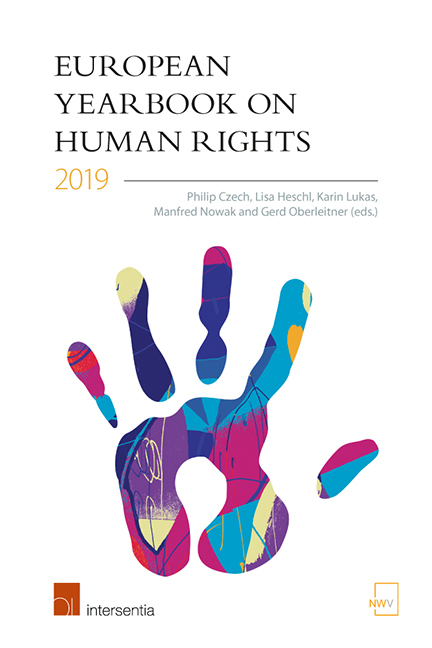Book contents
- Frontmatter
- Miscellaneous Frontmatter
- Editors’ Preface
- Contents
- List of Abbreviations
- List of Contributors
- PART I TOPIC OF THE YEAR
- PART II EU
- PART III CoE
- The Jurisprudence of the European Court of Human Rights in 2018
- Blasphemy and the European Court of Human Rights: A Small Step Forward, a Giant Leap Back
- How Do European Courts Approach the Sensitive Topic of Same-Sex Marriage? An Analysis of the Case Law of the ECtHR and the CJEU in the ‘Catch 22’-Field of Equal Marriage Rights
- The European Court of Human Rights and the Human Rights Model of Disability: Convergence, Fragmentation and Future Perspectives
- The Undermining of Article 6 ECHR
- The Right to a Nationality in Recent Case Law of the European Court of Human Rights and Council of Europe Bodies’ Work
- PART IV OSCE
- PART V REPORTS FROM THE FIELD
- PART VI OTHERS
- PART VII BOOK REVIEWS
- Index
The Right to a Nationality in Recent Case Law of the European Court of Human Rights and Council of Europe Bodies’ Work
from PART III - CoE
Published online by Cambridge University Press: 24 January 2020
- Frontmatter
- Miscellaneous Frontmatter
- Editors’ Preface
- Contents
- List of Abbreviations
- List of Contributors
- PART I TOPIC OF THE YEAR
- PART II EU
- PART III CoE
- The Jurisprudence of the European Court of Human Rights in 2018
- Blasphemy and the European Court of Human Rights: A Small Step Forward, a Giant Leap Back
- How Do European Courts Approach the Sensitive Topic of Same-Sex Marriage? An Analysis of the Case Law of the ECtHR and the CJEU in the ‘Catch 22’-Field of Equal Marriage Rights
- The European Court of Human Rights and the Human Rights Model of Disability: Convergence, Fragmentation and Future Perspectives
- The Undermining of Article 6 ECHR
- The Right to a Nationality in Recent Case Law of the European Court of Human Rights and Council of Europe Bodies’ Work
- PART IV OSCE
- PART V REPORTS FROM THE FIELD
- PART VI OTHERS
- PART VII BOOK REVIEWS
- Index
Summary
ABSTRACT
Although the right to a nationality has been recognised in the main international law instruments, the European Convention on Human Rights (ECHR or ‘the Convention’) and its additional protocols are silent on that issue. This lacuna has been, to a certain extent, filled by the European Convention on Nationality (ECN), adopted in 1997, but so far ratified only by 21 out of 47 Council of Europe Member States. Therefore, its impact has been limited. Nevertheless, in the past few years, the European Court of Human Rights (ECtHR) has dealt with a number of cases concerning nationality, mainly under Article 8 of the ECHR enshrining the right to respect for private life. Therefore, this contribution will analyse the recent case law of the ECtHR and will refer to the recent work of Council of Europe (CoE) bodies concerning issues related to nationality.
INTRODUCTION
DEFINITION OF NATIONALITY
It is now commonly accepted that nationality designates the legal bond existing between a person and a State and that States should not grant their nationality in the absence of a clear relation between the individual and the State This definition of ‘nationality’ comes from the 1955 Nottebohm (Liechtenstein v Guatemala) judgment of the International Court of Justice (ICJ), in which the ICJ upheld the principle of ‘effective nationality’, according to which it is the ‘effective (or genuine) link’ between a State and an individual which conferred upon the State the opportunity to afford diplomatic protection.
Although nationality is an institution of domestic legal order, it also plays a role at the international level, since it serves to distinguish a State's population and its jurisdiction over a particular person. In the doctrine, many authors consider it as an ‘empty’ notion, entailing no inherent rights and duties. Determining rules on the acquisition of nationality at birth has traditionally been the prerogative of States (see, in particular Article 3(1) of ECN). Therefore, there are no hard Therefore, there are no hard rules on criteria for the acquisition or loss of nationality in international law and there is very little case law by international courts on nationality matters.
- Type
- Chapter
- Information
- European Yearbook on Human Rights 2019 , pp. 313 - 336Publisher: IntersentiaPrint publication year: 2019



